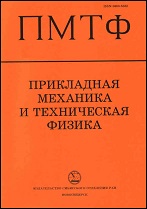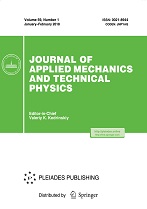|
|
Prikladnaya Mekhanika i Tekhnicheskaya Fizika, 2008, Volume 49, Issue 3, Pages 184–196
(Mi pmtf1921)
|
 |
|
 |
This article is cited in 5 scientific papers (total in 5 papers)
Evolutionary model of finite-strain thermoelasticity
A. A. Rogovoi, O. S. Stolbova
Institute of Mechanics of Continuous Media, Ural Division, Russian Academy of Sciences, Perm’, 614013
Abstract:
The equation of state of finite-strain thermoelasticity is obtained using a formalized approach to constructing constitutive relations for complex media under the assumption of closeness of intermediate and current configurations. A variational formulation of the coupled thermoelastic problem is proposed. The constitutive equation, the heat-conduction equation, the relations for internal energy, free energy, and entropy, and the variational formulation of the coupled problem of finite-strain thermoelasticity are tested on the problem of uniaxial extension of a bar. The model adequately describes experimental data for elastomers, such as entropic elasticity, temperature inversion, and temperature variation during an adiabatic process.
Keywords:
thermoelasticity, finite strains, slight compressibility, constitutive equations, heat-conduction equation, testing of model.
Received: 15.02.2007
Accepted: 07.06.2007
Citation:
A. A. Rogovoi, O. S. Stolbova, “Evolutionary model of finite-strain thermoelasticity”, Prikl. Mekh. Tekh. Fiz., 49:3 (2008), 184–196; J. Appl. Mech. Tech. Phys., 49:3 (2008), 500–509
Linking options:
https://www.mathnet.ru/eng/pmtf1921 https://www.mathnet.ru/eng/pmtf/v49/i3/p184
|


| Statistics & downloads: |
| Abstract page: | 51 | | Full-text PDF : | 21 |
|





 Contact us:
Contact us: Terms of Use
Terms of Use
 Registration to the website
Registration to the website Logotypes
Logotypes









 Citation in format
Citation in format 